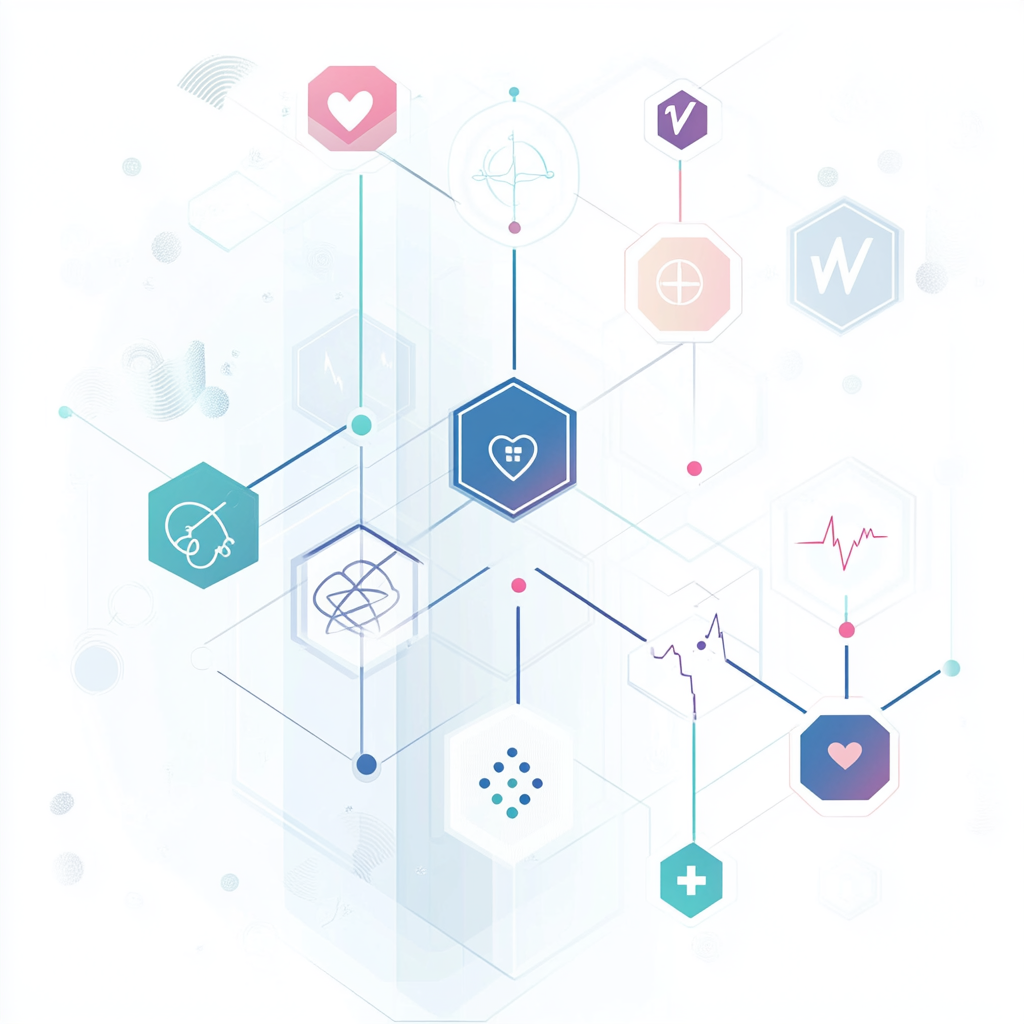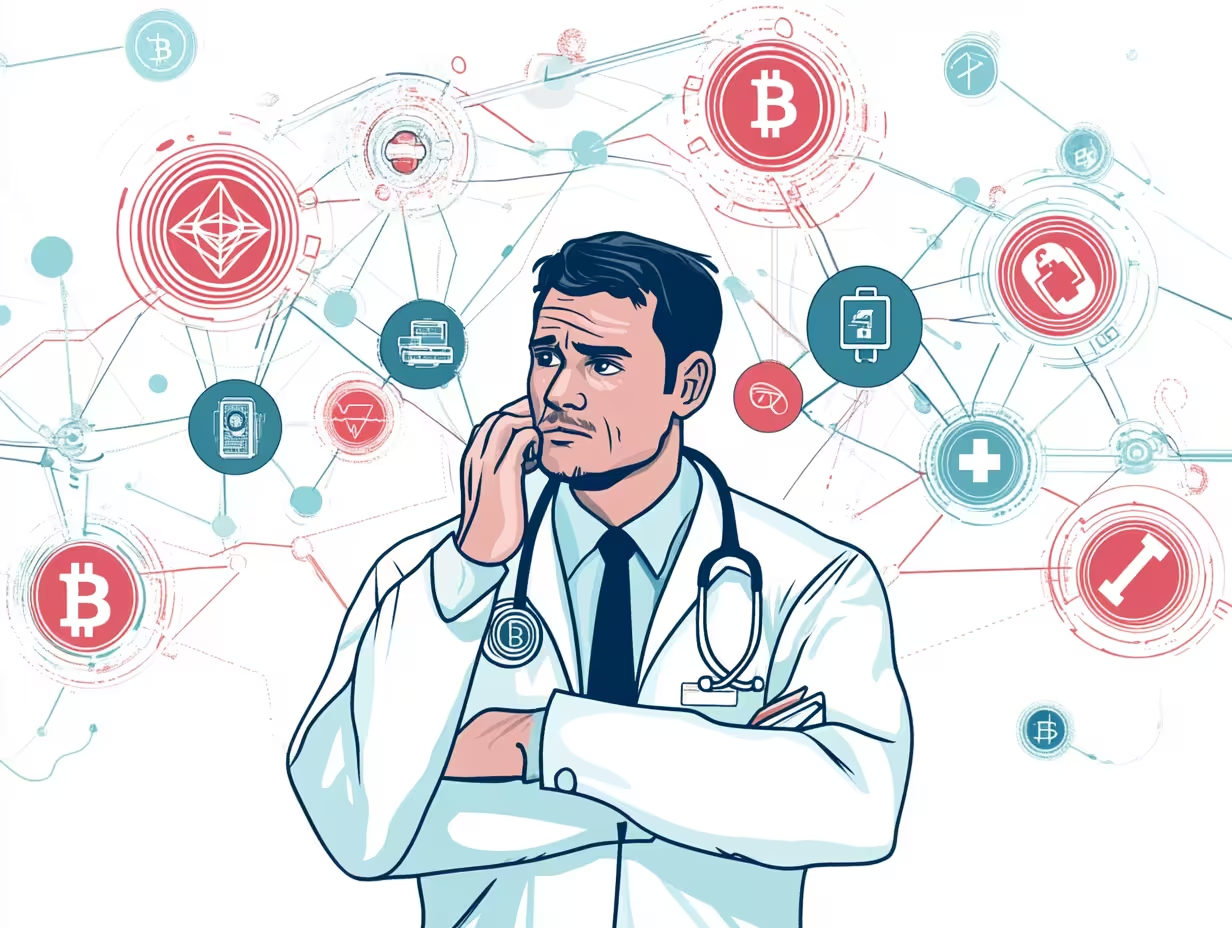5 Revolutionary Ways Blockchain in Healthcare Redefines Trust and Innovation for the Future
 Learn More About Godly Labs
Learn More About Godly Labs
Blockchain in Healthcare
Healthcare is at a turning point. Fragmented data, inefficiencies, and privacy concerns continue to challenge the system. Blockchain’s decentralized, secure architecture offers promising solutions—but its role in healthcare is still emerging. As explored in The Evolution of Technology, this new frontier holds the potential to redefine trust, transparency, and connection across the industry.
Understanding Blockchain’s Potential in Healthcare
Healthcare is at a pivotal moment. Persistent challenges—fragmented data systems, administrative inefficiencies, and mounting concerns about data privacy—demand transformative solutions. Blockchain technology, known for its decentralized and secure framework, offers potential solutions to many persistent healthcare challenges, as explained in this overview.
For Godly Labs Inc., the question is not just how Distributed ledger technology might address these challenges, but how it can do so in ways that prioritize patient care and trust.
These technologies core attributes offer promising possibilities for healthcare:
-
- Decentralization: Data is distributed across a network, eliminating single points of failure.
-
- Transparency and Immutability: Once added, data cannot be altered, fostering trust and accountability.
-
- Smart Contracts: Automated agreements streamline processes like claims processing or securing patient consent.
These features align with critical healthcare pain points:
-
- Data Silos: Blockchain could enable secure, seamless data sharing across providers.
-
- Security Concerns: With distributed ledger technology cryptographic design, breaches could become far less likely.
- Administrative Burden: Automating insurance claims and streamlining workflows could reduce costs and errors.
.

5 Ways Blockchain is Redefining Healthcare – Emerging Use Cases
Empowering Patient-Centric Data Ownership
Decentralized networks offer a secure way to share patient data, places control of health records in the hands of patients, enabling secure sharing with trusted providers. This shift empowers individuals, enhances privacy, and improves the efficiency of care coordination.
Imagine a system where your health history is securely stored, and you decide who has access to it. Blockchain in healthcare is making this a reality by redefining trust between patients and providers. Let’s explore five keyways blockchain is redefining healthcare
-
- Streamlining Insurance with Smart Contracts
By automating claims processing, blockchain eliminates manual delays and errors. Smart contracts execute payouts instantly when conditions—like verified treatments—are met.
Example Integration:
-
- “Smart contracts are the backbone of this transformation. They enable real-time approvals for claims, making ‘red tape’ in healthcare a thing of the past.”
-
- Streamlining Insurance with Smart Contracts
-
- Enhancing Drug Traceability in Supply Chains
Counterfeit medications are a global issue. Distributed ledger technology ensures transparency, tracing every drug’s journey from manufacturer to patient, boosting safety and trust. Implementing blockchain technology can significantly enhance drug traceability, thereby addressing global challenges such as counterfeit medications, as detailed in the study ‘A Blockchain-Based Approach for Drug Traceability in Healthcare Supply Chain‘ by Musamih et al
Example Integration:
-
- In healthcare supply chains isn’t just innovation—it’s lifesaving. By tracking authenticity, it protects patients from counterfeit drugs.
-
- Enhancing Drug Traceability in Supply Chains
-
- Revolutionizing Clinical Trials Clinical trials rely on data integrity, yet breaches or manipulations undermine trust. Blockchain ensures tamper-proof trial data and improves recruitment through tokenized health data.
Example Integration:
-
- “With blockchain, researchers gain a secure platform to store and share data, accelerating the path from trials to treatment.”
-
- Revolutionizing Clinical Trials Clinical trials rely on data integrity, yet breaches or manipulations undermine trust. Blockchain ensures tamper-proof trial data and improves recruitment through tokenized health data.
-
- Driving Interoperability Across Systems
Healthcare systems often operate in silos, leading to inefficiencies. Blockchain’s decentralized nature standardizes and simplifies data exchange, improving care coordination.
Example Integration:
-
- “Blockchain in healthcare tackles one of its biggest challenges—fragmentation. A unified, secure system ensures seamless collaboration between providers.
-
- Driving Interoperability Across Systems
5. Decentralization: Removing Single Points of Failure
Decentralization in blockchain means that data is stored across a distributed network rather than relying on a central server or authority. Each node in the network holds a copy of the blockchain, making it resistant to single points of failure or targeted cyberattacks.
- Unified Health Records: Imagine a future where every patient’s health record is securely stored on a decentralized blockchain. When patients move between doctors, hospitals, or even countries, their data is readily available and consistent across providers, eliminating the problem of fragmented records.
- Data Resilience: In disaster-prone areas or during cyberattacks, decentralized systems ensure that critical healthcare data remains accessible and safe, as it is not reliant on any one location or server.

The Human Factor:
Physicians and healthcare professionals, already stretched thin, often lack exposure to emerging technologies. Nearly all complete their training without a single business or technology course, making adoption of new tools challenging.
Technical and Regulatory Barriers:
- Scalability: Decentralized networks offer a secure way to share patient data. systems must efficiently handle vast amounts of healthcare data.
- Infrastructure Costs: Significant investment is required to implement blockchain solutions.
- Regulatory Complexity: Complying with regulations like HIPAA or GDPR adds layers of difficulty. Integrating blockchain into healthcare requires addressing compliance challenges such as HIPAA and GDPR. These frameworks demand that patient data is handled with the utmost care, as outlined in this HIPAA Journal article.
Godly Labs’ Perspective on Blockchain in Healthcare
Learning from Early Experiments:
Godly Labs ventured into blockchain technology through creative projects like “The Gods,” an NFT initiative inspired by Greek mythology. Designed to reflect the hierarchy and power dynamics of mythological figures, the project featured NFTs with unique attributes and layered rarities. These digital assets were minted on Ethereum, a blockchain known for its security and widespread adoption, but also criticized for its high energy consumption, transaction costs, and scalability challenges at the time.
While the project successfully showcased blockchain’s potential for creating verifiable and immutable digital assets, the experience revealed significant limitations. Ethereum’s infrastructure, though robust, proved heavy, expensive, and cumbersome for broader applications, especially those requiring scalability and cost efficiency.
These early experiments were invaluable learning experiences, highlighting both the promise and the pitfalls of blockchain. They reinforced the importance of focusing on targeted, high impact use cases rather than adopting technology for its own sake. This foundation has since guided Godly Labs toward a more strategic exploration of how decentralized systems can meaningfully address real-world challenges.
Envisioning a Patient-Centric Future:
The vision for blockchain at Godly Labs takes a measured approach, emphasizing the potential to develop solutions that meaningfully impact patient care while remaining mindful of the challenges and complexities involved.
- Tokenized health records for secure data sharing.
- Blockchain-based access tokens to simplify services.
- Smart contracts to automate repetitive processes.
The Path Forward
Blockchain in healthcare requires a strategic approach:
- Start Small:
Test blockchain applications with pilots in secure, low-risk environments. - Focus on Real Value:
Address tangible healthcare challenges, like improving outcomes or reducing administrative inefficiencies. - Commit to Long-Term Experimentation:
Blockchain’s evolution in healthcare will span years. Godly Labs is committed to iterative learning and improvement.
A Hopeful Yet Cautious Outlook
The intersection of decentralized networks offers a secure way to share patient data.” and healthcare represents an unprecedented opportunity to rethink systems that affect millions of lives. Yet, this journey demands patience, collaboration, and a deep understanding of both technology and human needs.
As Eric Blum reflects:
“Blockchain in healthcare is more than a tool; it’s an opportunity to rethink systems that impact lives every day. At Godly Labs, we believe real solutions come from blending technology with collaboration, understanding, and equity”
Collaboration as a Cornerstone:
Godly Labs recognizes that partnerships—with providers, regulators, and tech innovators—are essential to scaling blockchain solutions responsibly.
Transparency and Immutability: Building Trust in Data
Transparency means that data entries on a blockchain are visible to authorized participants, ensuring accountability. Immutability means that once a piece of data is recorded on the blockchain, it cannot be altered or deleted, ensuring its integrity.
Future Integration into Healthcare:
-
- Medical Research: Clinical trial data could be stored on a blockchain, where researchers, regulators, and the public can verify that the results have not been tampered with. This ensures trust in outcomes and speeds up regulatory approvals.
- Audit Trails: Every action taken on a patient’s record—whether it’s a diagnosis, prescription, or lab test—is logged immutably. This creates a transparent and secure audit trail that healthcare providers, regulators, and patients can review if needed.
- Fraud Prevention: Insurance claims processed via blockchain would include immutable proof of treatments received, preventing fraudulent activities.
Future Integrations in HealthCare
- Insurance Claims: A patient’s insurance claim could be processed instantly after their doctor uploads a treatment report. If the report matches the insurance terms, the smart contract automatically approves the claim and releases payment, reducing delays and manual errors.
- Consent Management: Patients could grant and revoke access to their health data through smart contracts. For example, a patient could allow a specialist temporary access to their medical history for consultation, with the contract expiring after the session.
- Supply Chain Automation: Decentralized networks offer a secure way to share patient Data, smart contracts could streamline the supply chain for medical devices and pharmaceuticals. Payments could be triggered automatically when goods are delivered and verified, reducing delays and errors in procurement.

Envisioning the Patient Experience of the Future – 2050
Scenario: A Seamless, Patient-Centric Experience
It’s 2050, and healthcare has been transformed by the integration of blockchain technology. Anna, a 45-year-old professional, schedules a routine checkup at her local clinic. Here’s how blockchain ensures her healthcare journey is efficient, secure, and patient-centric:
- Data-Driven Preparation:
Before Anna even steps into the clinic, her wearable health device has securely updated her blockchain-based health record. The device logs vital signs, sleep patterns, and recent physical activity, providing her physician with a complete, real-time picture of her health.- Example: Anna’s wearable flags elevated blood pressure, prompting her doctor to order additional tests automatically pre-approved by her insurance.
- Insurance Simplified with Smart Contracts:
Anna’s health insurance is linked to a smart contract on the blockchain. When her physician orders a blood test, the smart contract instantly verifies coverage and processes payment, eliminating paperwork and delays. Anna receives a notification confirming her coverage and test approval in seconds.- Impact: Administrative bottlenecks are removed, allowing healthcare providers to focus more on patient care and less on billing.
- Immutable Lab Results:
At the lab, Anna’s blood sample is tested, and the results are immediately logged on the blockchain. These results are immutable, meaning they cannot be altered, ensuring accuracy and trust. Anna and her doctor have instant access to the data, which includes a detailed explanation of her biomarkers and recommendations for follow-up care. - Prescription Authentication and Delivery:
Based on her test results, Anna’s doctor prescribes medication. The prescription is digitally signed and stored on the blockchain. The pharmacy verifies the prescription’s authenticity and checks for potential drug interactions using Anna’s blockchain record.- Additional Benefit: The blockchain-based supply chain confirms that Anna’s medication is genuine, with a complete record of its journey from manufacturer to pharmacy.
- Holistic Care Coordination:
Anna’s records are seamlessly shared with her physical therapist, who uses the data to tailor her exercise program. If Anna later sees a specialist, they too can securely access her up-to-date blockchain records without redundant paperwork or tests.- Outcome: A unified approach to care reduces errors, saves time, and ensures consistency across providers.
- Empowering Patient Ownership:
At every step, Anna is in control of her health data. Using a secure app, she reviews who has accessed her information and decides which providers can view specific details. When the treatment is complete, she revokes access, ensuring her privacy is maintained.
The Bigger Picture:
Anna’s journey represents the future of healthcare: one that is transparent, efficient, and deeply personalized. Blockchain ensures that every interaction—from a routine checkup to specialized care—is guided by trust, accuracy, and patient empowerment.
While Godly Labs recognizes blockchain’s potential, the focus remains on small-scale experimentation and learning rather than large-scale investment at this stage. the high cost and scalability issues of blockchain demand a thoughtful, measured approach.
As promising as the technology is, rushing into development without proven feasibility could divert valuable resources.
As we navigate the complexities of blockchain in healthcare, Godly Labs remains committed to learning, adapting, and contributing to meaningful solutions. Stay updated on our journey by visiting our News & Updates page
Written by Eric Blum
Last revised: April 3, 2025

